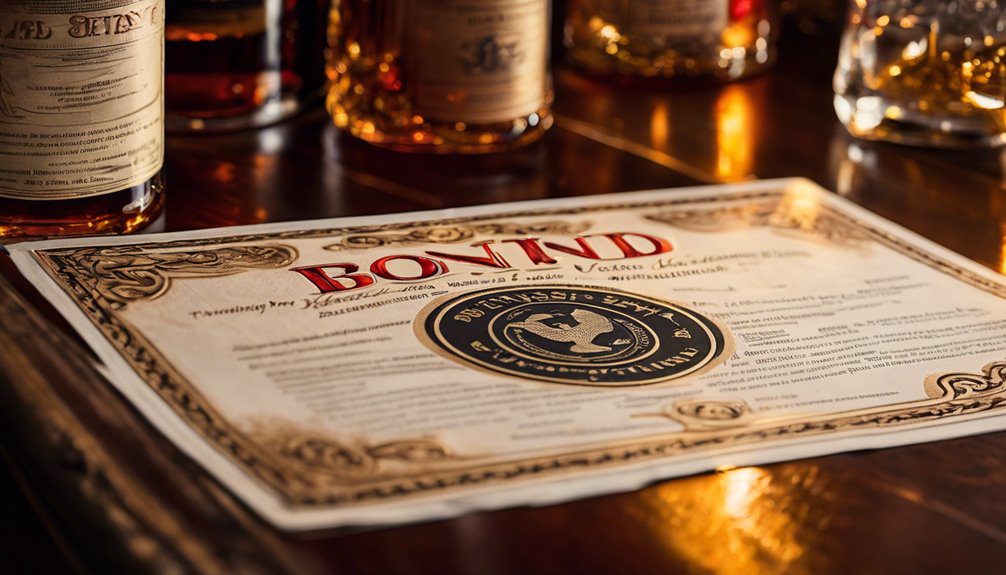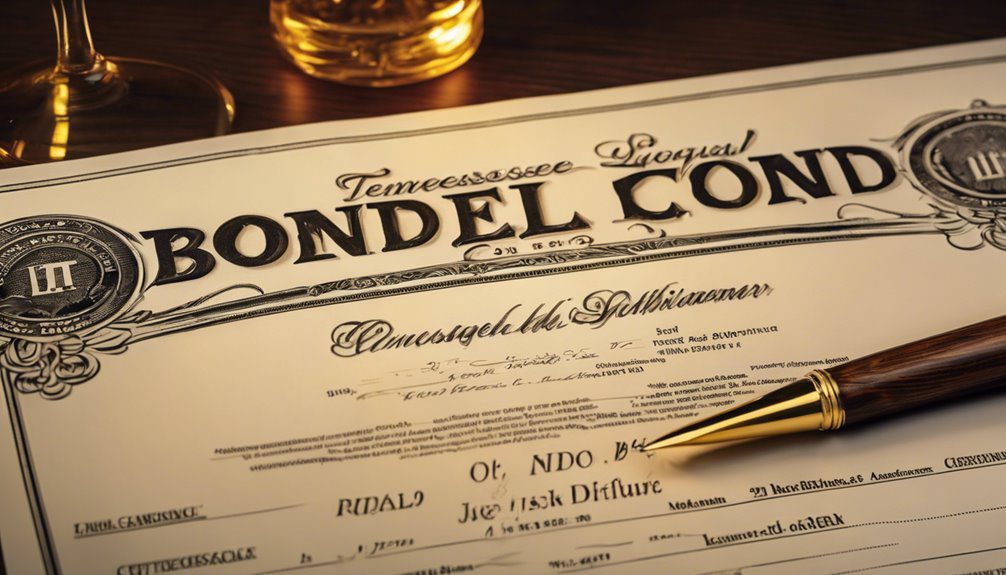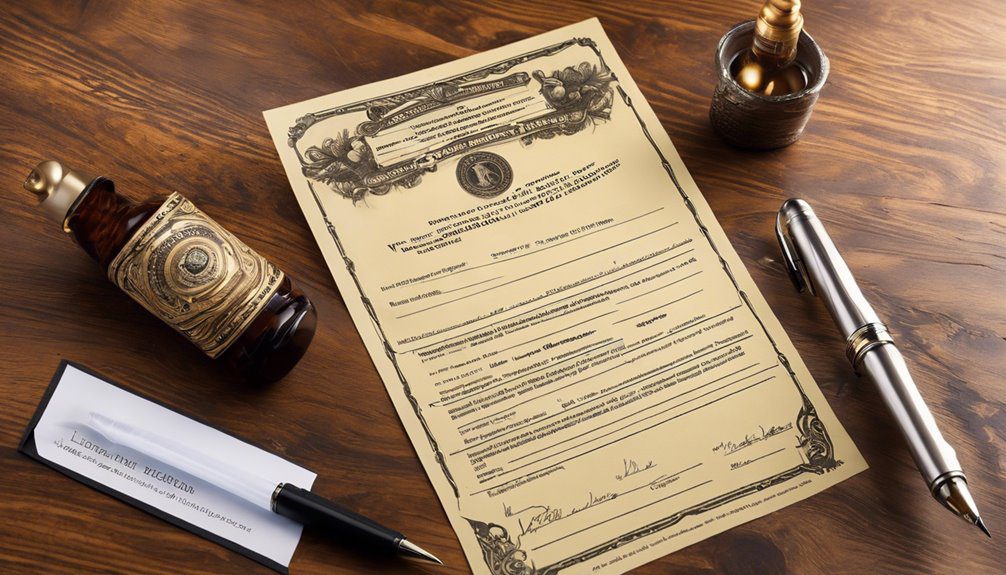If you're looking to sell alcohol in Tennessee, you'll need to understand the retail liquor license bond and its implications for your business. This bond not only acts as a financial safeguard, but it also ensures that you comply with state regulations, which is crucial for maintaining community trust. The process of obtaining this bond involves several steps, including financial assessments and application submissions. But what happens if you don't comply with the bond requirements? The consequences might be more significant than you think.
Understanding Liquor License Bonds

Why do liquor license bonds matter? They're essential for anyone looking to operate a business selling alcohol. These bonds serve as a financial guarantee that you'll comply with state laws and regulations regarding liquor sales. If you fail to meet your obligations, the bond ensures that the state can recover financial losses incurred due to your non-compliance.
When you apply for a retail liquor license in Tennessee, you'll need to secure a liquor license bond. This bond protects the public and ensures you operate responsibly. It acts as a safety net for the government, giving them a means to hold you accountable if you violate any laws, like failing to pay taxes or engaging in illegal sales practices.
Understanding the nuances of liquor license bonds can save you headaches down the road. You'll want to choose a reputable surety company to issue your bond, and you should also be aware of the specific requirements in Tennessee. Additionally, bond amounts can vary based on the type of alcohol license you are applying for, so it's crucial to be informed about the financial obligations involved.
Having this bond isn't just a regulatory hurdle; it's a vital part of ensuring your business runs smoothly and maintains its good standing in the community.
Importance of a Retail Liquor License
A retail liquor license is vital for anyone looking to sell alcohol legally in Tennessee. This license not only ensures you're compliant with state laws but also protects your business from hefty fines and legal issues. Without it, you risk facing severe penalties, including potential shutdowns or criminal charges.
Having this license demonstrates your commitment to responsible alcohol sales, fostering trust with customers and the community. It allows you to engage in a regulated market, ensuring you're sourcing your products from legitimate suppliers and adhering to safety standards.
Moreover, a retail liquor license can enhance your business's reputation. It signals to customers that you operate within the law and prioritize responsible service. This can attract a loyal customer base, as patrons feel more confident purchasing from a licensed retailer.
Additionally, many suppliers won't work with businesses that lack a valid liquor license, limiting your product options. In a competitive market, having a retail liquor license gives you an edge, enabling you to offer a diverse range of alcoholic beverages.
Requirements for Obtaining a Bond

Before you can obtain a retail liquor license in Tennessee, you'll need to secure a liquor license bond, which acts as a form of financial protection for the state and your customers. To get this bond, you'll need to meet specific requirements.
First, you must have a valid retail liquor license application submitted to the appropriate local authorities. Next, you'll typically need to provide personal information, including your Social Security number and business details. This information helps the surety company assess your risk and determine your eligibility.
In addition, you may need to demonstrate your financial stability. This often includes providing financial statements, bank statements, or other proof of income. Your credit history may also be evaluated, so it's wise to check your credit report beforehand and address any discrepancies.
Lastly, be prepared to pay a premium to the surety company for the bond. The amount varies based on your creditworthiness and the bond amount required by the state.
Once these requirements are met and the bond is secured, you'll be one step closer to obtaining your retail liquor license.
Costs Associated With the Bond
When you're budgeting for your retail liquor license bond in Tennessee, it's crucial to understand the associated costs. The bond amount you'll need typically ranges from $1,000 to $100,000, depending on your specific business requirements and the type of liquor you're selling. This bond amount is a guarantee to the state that you'll comply with all liquor laws and regulations.
However, the actual cost to you isn't the bond amount itself but rather the premium you'll pay to secure the bond. This premium usually falls between 1% and 10% of the total bond amount, depending on your creditworthiness and the underwriting criteria of the surety company.
For example, if you're required to obtain a $50,000 bond, and your premium rate is 3%, you'd pay $1,500 annually.
Additionally, keep in mind that some surety companies may charge extra fees for processing or underwriting. It's wise to shop around and compare premiums and fees from different surety providers to ensure you're getting the best deal for your retail liquor license bond. Understanding bond costs will help you plan your budget more effectively.
How to Apply for the Bond

Navigating the application process for your Tennessee retail liquor license bond can be straightforward if you follow the right steps.
First, gather all necessary documentation, including your business license, identification, and any relevant financial statements. This information is crucial for the surety company to assess your eligibility.
Next, research and choose a reputable surety company that specializes in liquor bonds. Reach out to them for a quote, and they'll provide you with the bond amount required based on local regulations and your business type.
Once you receive your quote, review the terms and ensure you understand the conditions attached to the bond.
After you've selected a surety company, complete the application form they provide. Be honest and thorough in your responses; any discrepancies can delay the process.
Once you submit the application, the surety company will evaluate your financial stability and risk factors.
If approved, you'll receive your bond, which you can then submit along with your liquor license application to the state.
Bond Renewal and Compliance
To maintain your Tennessee retail liquor license, staying on top of bond renewal and compliance is crucial. Your surety bond generally has a set term, often one year, so it's essential to monitor its expiration date.
You'll need to renew it before it expires to avoid any interruptions in your license. Reach out to your surety company well in advance of the expiration date. They'll provide you with the necessary paperwork and information regarding any premium adjustments.
It's wise to review your bond coverage to ensure it meets current state requirements. In addition to renewing your bond, you must comply with all state regulations related to your liquor license.
This includes adhering to local laws, maintaining proper records, and ensuring your business operations remain within legal boundaries. Regularly review your compliance status to identify any areas needing attention.
Consequences of Non-Compliance

Failing to comply with Tennessee's liquor licensing regulations can lead to serious consequences that jeopardize your business. You risk hefty fines, which can accumulate quickly if violations continue. These financial penalties can strain your budget, affecting your ability to operate effectively.
Moreover, non-compliance can result in the suspension or revocation of your liquor license. Losing your license means you can't legally sell alcoholic beverages, which could drive customers away and significantly reduce your profits. A temporary suspension can also tarnish your reputation, as customers may perceive your business as unreliable or untrustworthy.
In addition to these direct consequences, you may face legal issues. If you're caught violating regulations, you could be subjected to court actions or further penalties. This not only adds to your costs but can also distract you from running your business.
Lastly, persistent non-compliance can lead to increased scrutiny from regulatory authorities. This means more frequent inspections and a heightened risk of additional violations. It's vital to stay informed about the regulations and ensure you're in full compliance to protect your business and maintain a solid reputation.
Conclusion
In summary, securing a Tennessee retail liquor license bond is vital for your alcohol-selling business. It not only ensures compliance with state regulations but also protects your community's interests. By understanding the requirements, costs, and renewal process, you can navigate the application smoothly. Always stay compliant to avoid any consequences that could jeopardize your operations. Remember, this bond is more than just a requirement—it's a commitment to responsible business practices.

